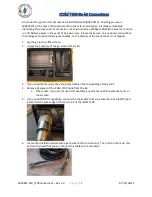
37
Basic Playback
OPERA
TION
DSP modes
The DSP (Digital Signal Processing) modes allow you to transform your living room into a variety of different
sonic environments when playing either two-channel or multi-channel sources.
HALL 1
Simulates the acoustic effects of a large concert hall. Suitable for classical music.
A long delay time of reflected sounds, coupled with reverb effects, lets the listener enjoy the dynamic and
rich sounds characteristic of concert halls and powerful orchestral performances.
HALL 2
Simulates the acoustic environment of a very resonant concert hall. Rich reverberation and a full sound
create the impression of a lively performance space.
JAZZ
Simulates the acoustic effects of a jazz club. Reflected sound is virtually below 100 msec so that the listener
can enjoy a live band effect.
DANCE
Simulates the acoustic effects of a dance club. Features a strong bass sound.
Reflected sound delay time is virtually below 50 msec, for the listener to enjoy the the visceral power of
dance music.
THEATER 1
Reproduces theater sound field effects without losing the localization of each channel. Theater effects can
be enjoyed without losing Dolby Digital/ Pro Logic effects when used in combination those formats (with
movies bearing the
3
trademark).
THEATER 2
Simulates the acoustic environment of a theater while maintaining proper localization of each channel.
Stereo mode
Use the STEREO mode to enjoy standard (two-channel) stereo sound from the front left and right speakers.
This mode also allows you to :
• Use the BASS and TREBLE tone controls
• Use DIRECT for truer reproduction of the original recording.
• Use DIGITAL NR.
See display explanations on p.20-21 and front panel explanations on p.18-19 for details on SPEAKERS (A/B),
LOUDNESS, BASS (–/+) and TREBLE (–/+).
When listening to Dolby Digital or DTS sources, DIGITAL NR do not function even if you select
STEREO.
















































